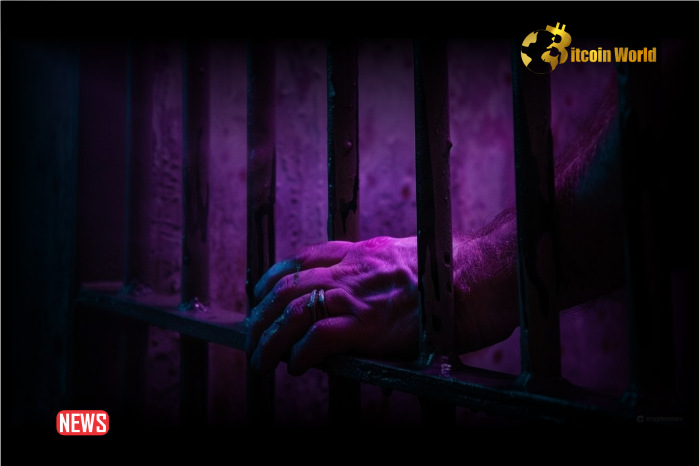In a significant ruling against financial crimes in the digital asset space, a South Korean crypto fraudster is set to spend a decade behind bars. The High Court has firmly upheld the original 10-year jail sentence handed down to the CEO, surnamed Wi, of Tae Sung E&C Group, sealing his fate in a massive fraud case.
According to reports from South Korean media giants Herald Kyungjae and Chosun Ilbo, the Gwangju High Court’s Second Criminal Division 2 delivered a decisive blow on June 18th. They dismissed Wi’s appeal, confirming the district court’s initial verdict and sending a strong message against crypto-related financial misconduct.
How Did a Solar Power Business Branch into Crypto Fraud?
Initially, Wi’s business, Tae Sung E&C Group, primarily focused on solar power plant sales. However, the court revealed a darker side to his entrepreneurial ambitions. Wi reportedly lured over $82.6 million from hundreds of investors with promises of “guaranteed” returns – a red flag in the often volatile investment world.
Prosecutors detailed that while his initial ventures were in solar energy, Wi strategically “expanded” his operations into a web of sectors, including:
- Cryptocurrency
- Smart Agriculture
- Restaurants
- Movie Production
- Insurance
This diversification, however, masked a fraudulent scheme that ultimately led to his downfall. His arrest in June 2023 followed numerous complaints filed by defrauded investors with the Gwangju Police Agency, as Pressian reported earlier.
The Lure of “Guaranteed” High Returns: 8% to 12% Interest
Operating from his base in Buk District, Gwangju, Wi and his firm are accused of deceiving a staggering 1,678 individuals. The method? “Promising” to safeguard their investments while guaranteeing attractive “high interest rates of 8-12%.” These figures, significantly above typical market returns, should have raised alarm bells for potential investors.
The scheme ran from 2018 to 2021, during which Wi amassed the millions. Crucially, prosecutors exposed Wi’s operation as a classic “Ponzi scheme.” This meant earlier investors were paid not from genuine profits, but with funds pooled from newer investors – an unsustainable model destined to collapse.
The District Court had previously found Wi guilty of violating the Act on the Aggravated Punishment of Specific Economic Crimes and for “embezzling company funds.” His methods of attracting investors included online platforms like Naver Cafe, where he “recruited investors”. However, instead of legitimate business expansion, Wi allegedly “wasted most of the money on failed business expansion plans,” further exacerbating the losses for his victims.
Why the High Court Refused to Budge on the Sentence
The High Court judge presiding over the appeal made it clear why the original 10-year sentence remained unchanged. The reasons were stark and compelling:
- Numerous Victims: The crime impacted a large number of people, highlighting the extensive reach of the fraud.
- Significant Financial Damage: The sheer scale of the $82.6 million fraud represented a devastating financial blow to the victims.
Adding to Wi’s predicament, the court noted his failure to adequately compensate victims even during the appeal process. Despite returning a small “portion” of the funds, the court deemed his efforts to reimburse victims since his initial trial as lacking any special “efforts.”
While Wi expressed “remorse,” the judge emphasized the profound “mental and economic hardships” endured by the victims who lost their investments. In a definitive statement, the judge concluded:
“The [District Court’s] sentence does not seem too lenient or overly severe. And there has been no change in the circumstances since the original verdict was issued.”
Initially, police underestimated the scope of the fraud, believing fewer than 800 individuals were affected. The revised figure of 1,678 victims underscores the widespread impact of Wi’s scheme.
The court also highlighted Wi’s involvement in “promoting virtual asset issuance” and token “distribution,” confirming the crypto element of his fraudulent activities.
Crypto Fraud on the Rise: A Growing Global Concern
Gwangju, and indeed South Korea as a whole, is witnessing an alarming surge in crypto investment fraud. This trend isn’t isolated to South Korea. Globally, crypto scams are becoming increasingly prevalent.
The concerning statistics from the United States FBI underscore this point. In a recent report, they revealed a dramatic 53% increase in fraud cases, jumping from $2.57 billion in losses in 2022 to approximately $3.94 billion in 2023. This global escalation highlights the urgent need for investor vigilance and stronger regulatory measures in the burgeoning crypto space.
Wi’s case serves as a stark reminder of the risks associated with unregulated or poorly regulated investment schemes, particularly within the volatile cryptocurrency market. The promise of guaranteed high returns should always be treated with extreme skepticism, and investors are urged to conduct thorough due diligence before entrusting their funds, especially in the seemingly lucrative but often perilous world of crypto investments.
Disclaimer: The information provided is not trading advice, Bitcoinworld.co.in holds no liability for any investments made based on the information provided on this page. We strongly recommend independent research and/or consultation with a qualified professional before making any investment decisions.


